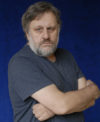Is There a Post-Human Sexuality?
FEATURED RESEARCH PAPER, 23 Sep 2024
Slavoj Žižek | Journal of Philosophical Investigations – TRANSCEND Media Service
Abstract
7 Sep 2024 – Will human sexuality survive the passage to Artificial Intelligence? To answer this question properly, we should first analyze the paradoxical inner structure of sexuality itself, which is never simply binary: it always involves a third element that gives body to the deadlock of sexual difference – this is what Lacan meant by “there is no sexual difference.” This is why sexuality is in itself excessive and perverse. For this reason, all attempts to “normalize” sexuality by way of keeping it within the limits of moderation miserably fail: today, we find on the market products deprived of their dangerous element (coffee without caffeine, chocolate without sugar…), and the moderate sexuality is sexuality without sex.
The Buddhist attempts to contain the excess sexuality miss the point of sexuality: intense sexuality is in itself the greatest sacrifice (the sacrifice of peaceful moderate life) – in sexuality, we enjoy the pain, the renunciation itself. However, today, in our world pervaded by commodification and technological inventions, real human partners are more and more replaced by what Lacan called lathouses, artificial objects aimed at satisfying our sexual desire without another human being (plastic phalluses, digitalized pornography). The result is that we are thrown into a space of limitless pleasures where, although “everything is permitted,” our intense sexual desire gets anaestheticized.
To read full paper download PDF file:
Is There a Post-Human Sexuality?
_______________________________________________
 Slavoj Žižek, a Slovenian cultural philosopher and psychoanalyst, is senior researcher at the Institute for Sociology and Philosophy at the University of Ljubljana, Global Distinguished Professor of German at New York University, and international director of the Birkbeck Institute for the Humanities of the University of London. He has also been a visiting professor at more than 10 universities around the world. Žižek is the author of many books, including Living in the End Times, First As Tragedy Then As Farce, The Fragile Absolute and Did Somebody Say Totalitarianism? He lives in London.
Slavoj Žižek, a Slovenian cultural philosopher and psychoanalyst, is senior researcher at the Institute for Sociology and Philosophy at the University of Ljubljana, Global Distinguished Professor of German at New York University, and international director of the Birkbeck Institute for the Humanities of the University of London. He has also been a visiting professor at more than 10 universities around the world. Žižek is the author of many books, including Living in the End Times, First As Tragedy Then As Farce, The Fragile Absolute and Did Somebody Say Totalitarianism? He lives in London.
FEATURED RESEARCH PAPER STAYS POSTED FOR 2 WEEKS BEFORE BEING ARCHIVED
Tags: Artificial Intelligence AI, Human behaviors, Human nature, Humans, Life, Paradigm change, Philosophy, Research, Sexualities
DISCLAIMER: The statements, views and opinions expressed in pieces republished here are solely those of the authors and do not necessarily represent those of TMS. In accordance with title 17 U.S.C. section 107, this material is distributed without profit to those who have expressed a prior interest in receiving the included information for research and educational purposes. TMS has no affiliation whatsoever with the originator of this article nor is TMS endorsed or sponsored by the originator. “GO TO ORIGINAL” links are provided as a convenience to our readers and allow for verification of authenticity. However, as originating pages are often updated by their originating host sites, the versions posted may not match the versions our readers view when clicking the “GO TO ORIGINAL” links. This site contains copyrighted material the use of which has not always been specifically authorized by the copyright owner. We are making such material available in our efforts to advance understanding of environmental, political, human rights, economic, democracy, scientific, and social justice issues, etc. We believe this constitutes a ‘fair use’ of any such copyrighted material as provided for in section 107 of the US Copyright Law. In accordance with Title 17 U.S.C. Section 107, the material on this site is distributed without profit to those who have expressed a prior interest in receiving the included information for research and educational purposes. For more information go to: http://www.law.cornell.edu/uscode/17/107.shtml. If you wish to use copyrighted material from this site for purposes of your own that go beyond ‘fair use’, you must obtain permission from the copyright owner.
Join the discussion!
We welcome debate and dissent, but personal — ad hominem — attacks (on authors, other users or any individual), abuse and defamatory language will not be tolerated. Nor will we tolerate attempts to deliberately disrupt discussions. We aim to maintain an inviting space to focus on intelligent interactions and debates.
Read more
Click here to go to the current weekly digest or pick another article:
FEATURED RESEARCH PAPER: